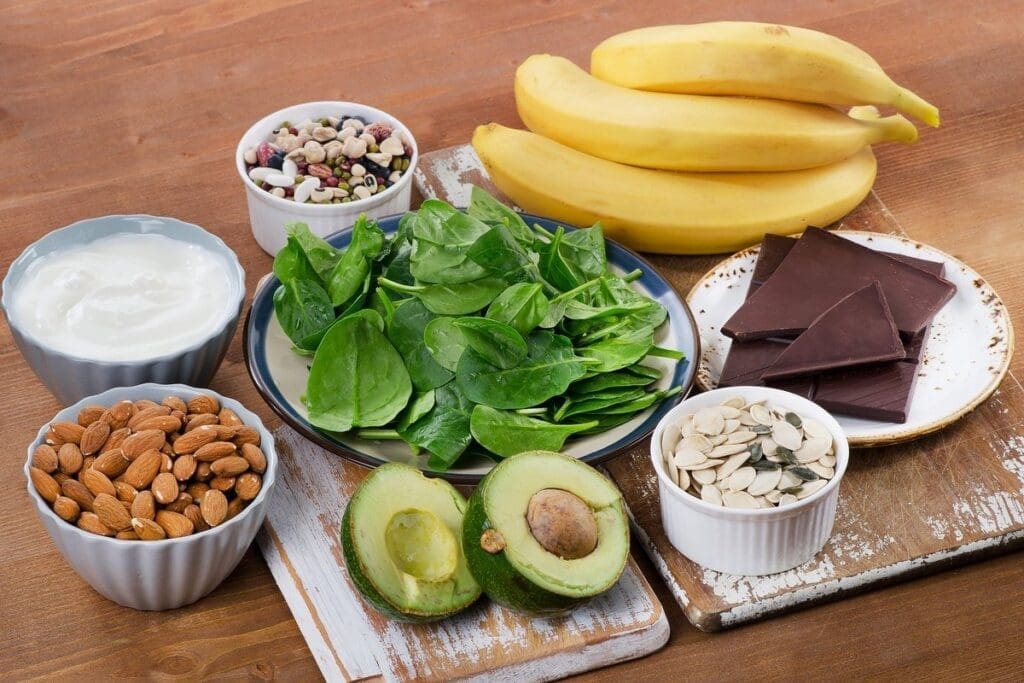Last Updated on November 26, 2025 by Bilal Hasdemir

Eating right is key to a healthy colon and less risk of colon diseases like colorectal cancer. Foods good for the colon can really help your overall health.
Studies show that eating lots of fruits, veggies, whole grains, legumes, fish, nuts, and low-fat dairy is good for your best foods for colon health. Adding these to your meals can keep your bowel healthy.
Liv Hospital focuses on patient care and a healthy bowel diet to prevent colon problems. Making smart food choices helps keep your colon in top shape.

Diet and colon health are closely linked. Certain foods can protect against colorectal cancer and other digestive issues. What we eat greatly affects our digestive health.
Our food choices greatly impact our colon health. Eating lots of fruits, vegetables, and whole grains supports our digestive health. These foods are full of fiber, which helps keep our bowels regular and prevents constipation.
Fiber-rich foods also help good gut bacteria grow. A healthy gut microbiome is key for digestion, nutrient absorption, and fighting off bad bacteria.
Colorectal cancer is a common cancer worldwide. Diet is a big factor in its risk. Eating a lot of red and processed meats can raise the risk. But, eating more fruits, vegetables, and whole grains can lower it.
| Dietary Factor | Effect on Colorectal Cancer Risk |
| High consumption of red and processed meats | Increased risk |
| High intake of fruits and vegetables | Reduced risk |
| High fiber intake | Reduced risk |
Knowing these risk factors helps us make better diet choices. This can lower our risk of colorectal cancer.

Understanding fiber and the gut microbiome is key to a healthy colon. The gut microbiome is vital for our health. Fiber helps it function well.
Dietary fiber makes stool bulkier, helping it move through the digestive system. This prevents constipation and reduces diverticulitis risk. Eating foods rich in fiber, like fruits, veggies, and whole grains, keeps the bowel healthy.
A diet full of fiber also keeps bowel movements regular. This stops constipation and diarrhea. Regular bowel movements are key for removing toxins and keeping the colon healthy.
Fiber fermented by the gut microbiome makes short-chain fatty acids (SCFAs). SCFAs give energy to colon cells and keep the gut healthy. They also fight inflammation, which helps prevent colon cancer.
SCFAs production is vital for the gut microbiome. Eating fiber rich foods supports this process. This helps keep the gut microbiome and colon healthy.
The gut microbiome has trillions of beneficial microorganisms. These bacteria are essential for a healthy colon. They ferment fiber and make SCFAs. They also keep the immune system in check and stop harmful bacteria from growing.
Eating healthy foods for colon that are high in fiber helps these beneficial bacteria grow. This improves health and lowers the risk of colon diseases.
Fruits and vegetables are key for a healthy colon. They are full of fiber, vitamins, and minerals. These foods help keep your bowel movements regular and support your digestive system.
Leafy greens like spinach, kale, and Swiss chard are great for your colon. They are rich in fiber and antioxidants. These nutrients help keep your digestive system running smoothly and reduce inflammation.
Berries, including blueberries, strawberries, and raspberries, are full of antioxidants and fiber. They protect your colon from damage and support good gut bacteria.
Vegetables like broccoli, cauliflower, and Brussels sprouts have sulforaphane. This compound has anti-cancer properties. These veggies help detoxify your body and lower the risk of colon cancer.
Fruits like apples and pears are good for your colon. They help keep your bowel movements regular and support good gut bacteria. The fiber in these fruits also helps prevent colon cancer.
| Fruit/Vegetable | Fiber Content (per serving) | Colon Health Benefits |
| Spinach | 4.3 grams per cup cooked | Promotes regularity, reduces inflammation |
| Blueberries | 3.6 grams per cup | Rich in antioxidants, supports beneficial gut bacteria |
| Broccoli | 5.1 grams per cup cooked | Contains sulforaphane, anti-cancer properties |
| Apples | 4.5 grams per medium apple | Regulates bowel movements, supports beneficial gut bacteria |
Eating a variety of fruits and vegetables can greatly benefit your colon health. A colorful diet ensures you get all the nutrients and fiber your body needs.
Whole grains and legumes are packed with nutrients that help keep your digestive system healthy. They are full of fiber, protein, and other nutrients. These foods support colon health and lower the risk of colon cancer.
Barley, oats, and brown rice are great for your diet. Barley has beta-glucan, a fiber that lowers cholesterol and helps with regular bowel movements. Oats calm your digestive system. Brown rice has insoluble fiber, which prevents constipation.
Quinoa is a superfood that’s full of protein, fiber, and minerals. It’s a complete protein, perfect for vegetarians and vegans. Other ancient grains like amaranth and teff are also nutritious and good for your gut.
Beans and lentils are legumes that boost digestive health. They’re high in fiber and protein, helping with bowel movements and gut bacteria. Try black beans, kidney beans, and lentils for a nutritious and tasty meal.
Chickpeas and split peas are great for your gut. They’re full of fiber, protein, and vitamins. Adding them to your meals can keep your gut healthy and support digestion.
Gut health is greatly affected by what we eat, mainly foods high in probiotics. Probiotic-rich foods help grow good bacteria, improving digestion and health.
Yogurt is famous for its probiotics, adding good bacteria to our gut. Kefir, a fermented milk, has even more types of bacteria. Both can make digestion better and strengthen our immune system.
Foods like sauerkraut and kimchi are full of probiotics. They’re also packed with vitamins and minerals. Adding them to your meals can improve digestion and balance your gut.
Kombucha, a fermented tea, has lots of good probiotics. Drinks like kvass and some juices also have probiotic benefits. They’re tasty ways to keep your gut healthy.
Eating these probiotic-rich foods can really help your gut health. By choosing the right foods, you can keep your gut balanced and feel better overall.
Eating the right fats and proteins is key for a healthy colon. A diet full of healthy fats and proteins helps the colon stay healthy. It also fights inflammation, which is important in preventing colon cancer.
“A well-balanced diet with healthy fats and proteins is vital for a healthy colon,” says Dr. Jane Smith, a top gastroenterologist. The right dietary choices can make a big difference in colon health.
Fatty fish like salmon, mackerel, and sardines are full of omega-3 fatty acids. These acids are great at fighting inflammation in the colon. They also help with digestion.
Nuts and seeds, like walnuts, flaxseeds, and chia seeds, are great for healthy fats and fiber. They help keep the colon healthy by promoting regular bowel movements. They also feed good bacteria in the gut.
Olive oil and avocados are full of monounsaturated fats. These fats have anti-inflammatory effects. Adding these foods to your diet can protect your colon and boost your overall health.
“The anti-inflammatory properties of olive oil and avocados make them valuable additions to a colon-healthy diet,” notes a study published in the Journal of Nutrition.
By adding these healthy fats and proteins to your diet, you can greatly improve your colon health. This can also lower the risk of colon-related problems.
Some foods can harm your colon health. It’s important to know which ones to limit or avoid. A diet full of fruits, veggies, and whole grains is key. But, it’s also vital to watch out for foods that might not be as good for you.
Eating too much red and processed meat can raise your risk of colon cancer. Red meats like beef and lamb, and processed meats like sausages and bacon, can harm your colon. Cutting down on these foods can help lower this risk.
Diets rich in refined carbohydrates and added sugars can harm your colon health. These foods often lack fiber and are high in empty calories, leading to digestive problems.
Alcohol consumption can harm your colon health. It can cause inflammation in your digestive tract and increase your risk of colon cancer. It’s important to drink alcohol in moderation.
Knowing which foods to limit can help support your colon health and overall well-being.
To keep your colon healthy, it’s key to eat a variety of foods. A balanced diet supports your colon and lowers colon cancer risk.
A daily menu for a healthy colon could be:
This menu includes foods good for your colon. It has fiber-rich fruits and veggies, lean protein, and healthy fats.
To boost fiber, start small by:
Slowly increasing fiber helps avoid digestive issues.
Drinking enough water is vital for digestion. Ways to stay hydrated include:
Drinking enough water prevents constipation and keeps your colon healthy.
Keeping your colon healthy is key for your overall well-being. What you eat plays a big role in this. Eating the right foods can help your bowel stay healthy and lower the risk of colon problems.
Choosing the right foods is important for a balanced digestive system. Eat lots of whole grains, fruits, veggies, and foods with probiotics. These help keep your bowel regular and support good gut bacteria.
By eating a diet good for your colon and avoiding bad foods, you can help keep your colon healthy. This can also lower your risk of colon cancer and other digestive issues.
Focus on making dietary choices that support your colon health. This way, you can take care of your digestive system and enjoy a better life.
A healthy bowel diet includes foods that are good for your colon. This includes fruits, vegetables, whole grains, and lean proteins. These foods help keep your colon healthy and lower the risk of colon cancer.
Diet is very important for a healthy colon. Eating foods high in fiber, fruits, and vegetables helps keep your colon healthy. It also lowers the risk of colorectal cancer.
The best foods for your colon include leafy greens, berries, and cruciferous vegetables. Also, high-fiber fruits, whole grains, legumes, probiotic-rich foods, healthy fats, and lean proteins are good choices.
Fiber is key for a healthy gut microbiome and colon health. It helps with regular bowel movements and produces short-chain fatty acids. It also supports beneficial gut bacteria.
Colon-friendly foods include spinach, kale, blueberries, and strawberries. Also, brown rice, quinoa, beans, and lentils are good choices.
To make a balanced meal plan, eat a variety of colon-friendly foods. Include fruits, vegetables, whole grains, and lean proteins. Start by gradually increasing your fiber intake and drink plenty of water.
Limit or avoid red and processed meats, refined carbohydrates, added sugars, and too much alcohol. These foods can harm your colon health.
Probiotic-rich foods like yogurt and kefir help grow good gut bacteria. They keep your gut microbiome healthy.
Healthy fats and proteins for your colon include fatty fish like salmon. Nuts and seeds like walnuts and chia seeds are also good. Olive oil and avocados are healthy choices too.
To keep your colon healthy long-term, make smart food choices. Eat a variety of colon-friendly foods and avoid unhealthy ones. Stay hydrated too.
Hydration is very important for digestive health. It helps prevent constipation and promotes regular bowel movements. It also supports the health of your gut microbiome.
Subscribe to our e-newsletter to stay informed about the latest innovations in the world of health and exclusive offers!